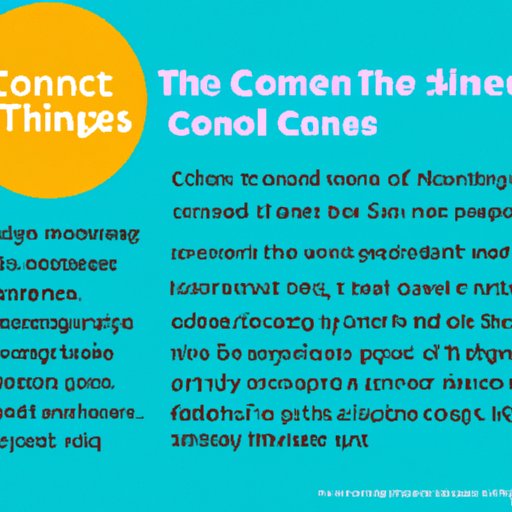Introduction
Concise writing is a style of writing that uses as few words as possible while still conveying the same message and meaning. It is a skill that requires practice and careful editing to achieve and can help writers communicate their thoughts and ideas in a more efficient and effective manner. In this article, we will explore the definition of concise writing and its benefits, along with techniques and strategies for writing concisely. We will also look at examples of concise writing and the power of short, succinct sentences.
Definition of Concise Writing
Concise writing is a style of writing that is focused, clear, and direct. It does not contain any unnecessary or superfluous words and is written in an economical manner. It is important to note that being concise does not mean sacrificing quality or clarity. Concise writing should be well-structured and organized, and should convey the writer’s intended message without ambiguity.
Benefits of Writing Concisely
Writing concisely has numerous benefits for both the writer and the reader. Firstly, it saves time for both parties as the reader is able to quickly understand the writer’s point, and the writer is able to get their point across in fewer words. Secondly, it makes the content easier to read and digest, as there is less text to wade through. Thirdly, it increases the impact of the writing, as it forces the writer to carefully consider every word and phrase they use.
Techniques and Strategies for Writing Concisely
There are several techniques and strategies that can help writers write concisely. Firstly, they should use short, succinct sentences wherever possible. Long, winding sentences are often difficult to follow and can detract from the overall message. Secondly, writers should avoid unnecessary wordiness by cutting out filler words and phrases. Thirdly, they should edit out any unnecessary information that does not directly contribute to the main point. Fourthly, they should focus on using active verbs rather than passive ones, as this will make the sentence more direct and impactful.
Examples of Concise Writing
Concise writing can be seen in many different forms, from newspaper and magazine articles to advertising copy and business communications. Newspapers and magazines often employ concise writing to communicate complex topics in a way that is easy to understand. Advertising copy also relies heavily on concise writing, as it must grab the reader’s attention quickly and effectively. Business communications such as emails, memos, and reports should also be written in a concise manner to ensure the message is clear and understood.
Power of Short, Succinct Sentences
The power of short, succinct sentences should not be underestimated. Brevity is key when it comes to writing concisely, as it allows the writer to get their point across quickly and effectively. Short sentences also increase clarity, as they make the content easier to read and comprehend. Lastly, they have greater impact, as they force the writer to carefully consider each word and phrase they use.
Conclusion
In conclusion, writing concisely has numerous benefits for both the writer and the reader. It saves time, makes the content easier to read, and increases the impact of the writing. There are several techniques and strategies that can help writers write concisely, such as using short, succinct sentences, avoiding unnecessary wordiness, and focusing on active verbs. Examples of concise writing can be seen in newspapers and magazines, advertising copy, and business communications. Lastly, the power of short, succinct sentences should not be underestimated, as they allow the writer to get their point across quickly and effectively.
(Note: Is this article not meeting your expectations? Do you have knowledge or insights to share? Unlock new opportunities and expand your reach by joining our authors team. Click Registration to join us and share your expertise with our readers.)
